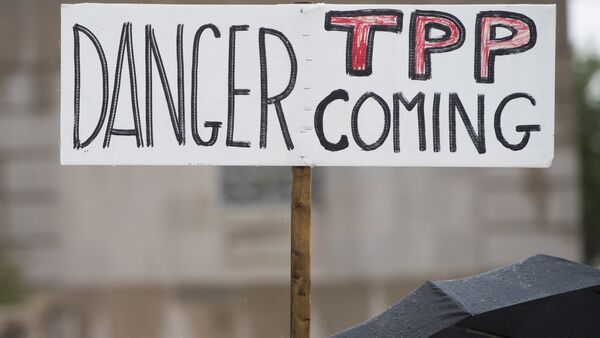It intends to promote economic integration across an area comprising 40 percent of the world economy, by liberalizing trade and investment rules, including the elimination of 98 percent of tariffs between the 12 members.
The complex full text of the agreement was finally released on Thursday, and so far critics have been able to highlight several areas of concern.
Medicine for the Poorest Gets More Expensive
Chapter 18 on intellectual property strengthens copyright protection, trademark and patent law. For example, the rules on 'biologics' state that pharmaceutical companies can seek up to eight years of market protection for medicine they make from biological sources, which are much more expensive than chemical drugs.
Some of the countries party to the agreement, such as Brunei, previously had no bar on cheaper medicines that copy such drugs, and patients there will now have to wait at least five years before they can be treated with such medicine.
Longer Copyright Protection
The agreement mandates the extension of the minimum copyright term for artistic and literary works to 70 years after the death of the author, rather than the current rule of 50 years, enshrined in the Berne convention. As a result, the public will have to wait another 20 years before works pass into the public domain.
The TPP — expanding US copyright law to the world… & restricting fair use https://t.co/IwkSfqqyKw
— soleternity (@soleternity) 4 ноября 2015
Individuals' Personal Information Can Be Transferred out of Their Country
Chapter 14 of the agreement on 'electronic commerce' reads, "Each Party shall allow the cross-border transfer of information by electronic means, including personal information, when this activity is for the conduct of the business of a covered person."
In addition, the chapter looks to prevent member countries from requiring companies to localize computing facilities on their territory, in order to prevent the misuse of citizen's information.
"No Party shall require a covered person to use or locate computing facilities in that Party’s territory as a condition for conducting business in that territory."
Companies Can Go to a Tribunal of Corporate Lawyers and Sue Governments
In Chapter 9, the agreement describes the Investor State Dispute Settlement mechanism, which allows foreign companies operating in a member country to pursue its interests in independent tribunals, rather than that country's court system.
Companies and investors will be able to sue national governments for damages, if the government passes a law which has a negative impact on their investments. In particular, such a system would allow financial institutions to demand compensation in a tribunal of corporate lawyers, for government measures that impair their profits.
given lack of corporate morality & social conscience, its imperative that investor state dispute settlement removed https://t.co/OaTaK0SzsC
— John Furr (@JohnFurrToronto) 6 ноября 2015
Climate Change Doesn't Warrant a Mention
Nowhere in the agreement is there any mention of a changing climate, and ways to stave off the threats of climate change. Instead, the chapter on the environment vaguely refers to the need to transition to a low emissions economy.
"Trans-Pacific Partnership & The #Environment: What's The Deal?" quotes @VoinovichSchool's Michael Zimmer https://t.co/gl9JTv500K @KUOW
— OHIO Media Relations (@ohioumedia) 6 ноября 2015
"The Parties acknowledge that transition to a low emissions economy requires collective action," according to Chapter 20. However, "each Party’s actions to transition to a low emissions economy should reflect domestic circumstances and capabilities," it reads, providing no specific measures to do so.




